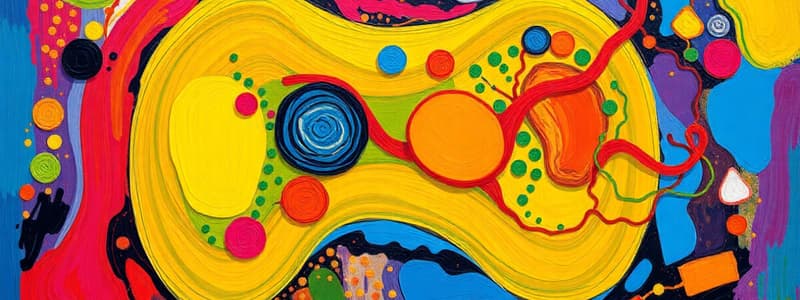Podcast
Questions and Answers
What happens to triacylglycerol levels when phosphatase activity is eliminated?
What happens to triacylglycerol levels when phosphatase activity is eliminated?
- Triacylglycerol levels fluctuate.
- Triacylglycerol levels remain the same.
- Triacylglycerol levels increase.
- Triacylglycerol levels decrease. (correct)
How many cycles are required to produce an 8-carbon fatty acid from acetyl-CoA?
How many cycles are required to produce an 8-carbon fatty acid from acetyl-CoA?
- 3 cycles
- 4 cycles (correct)
- 5 cycles
- 2 cycles
What is the role of insulin in relation to triacylglycerol synthesis?
What is the role of insulin in relation to triacylglycerol synthesis?
- Has no effect on triacylglycerols.
- Stimulates breakdown of triacylglycerols.
- Stimulates synthesis of triacylglycerols. (correct)
- Inhibits triacylglycerol synthesis.
What process occurs alongside ketogenesis to provide starting materials during fasting?
What process occurs alongside ketogenesis to provide starting materials during fasting?
What would happen to cAMP production if a mutation prevents the hydrolysis of GTP to GDP?
What would happen to cAMP production if a mutation prevents the hydrolysis of GTP to GDP?
Which metabolite derived from amino acids acts as a reducing agent for removing toxic peroxides?
Which metabolite derived from amino acids acts as a reducing agent for removing toxic peroxides?
What is biotin's specific function in fatty acid synthesis?
What is biotin's specific function in fatty acid synthesis?
Which process is NOT catalyzed during fatty acid synthesis?
Which process is NOT catalyzed during fatty acid synthesis?
Which molecule is produced during the conversion of pyruvate to PEP?
Which molecule is produced during the conversion of pyruvate to PEP?
When glucagon binds to liver cell receptors, what is the main outcome?
When glucagon binds to liver cell receptors, what is the main outcome?
What is required for the synthesis of glycogen?
What is required for the synthesis of glycogen?
Which of the following enzymes breaks down starch into glucose?
Which of the following enzymes breaks down starch into glucose?
Which regulatory molecule activates PFK-1 and inhibits FBPase-1?
Which regulatory molecule activates PFK-1 and inhibits FBPase-1?
What is the primary function of high-density lipoproteins (HDL)?
What is the primary function of high-density lipoproteins (HDL)?
Which product is formed during the oxidative phase of the pentose phosphate pathway?
Which product is formed during the oxidative phase of the pentose phosphate pathway?
In glycogen degradation, what does glycogen phosphorylase catalyze?
In glycogen degradation, what does glycogen phosphorylase catalyze?
What type of glycosidic bond links the monosaccharides in cellulose?
What type of glycosidic bond links the monosaccharides in cellulose?
Which amino acids contribute nitrogen atoms during purine and pyrimidine biosynthesis?
Which amino acids contribute nitrogen atoms during purine and pyrimidine biosynthesis?
What are nuclear receptors primarily activated by?
What are nuclear receptors primarily activated by?
What is the reduced electron carrier required for fatty acid synthesis?
What is the reduced electron carrier required for fatty acid synthesis?
What correctly describes feedback inhibition in biosynthesis pathways?
What correctly describes feedback inhibition in biosynthesis pathways?
What effect does elevated insulin have on liver cells?
What effect does elevated insulin have on liver cells?
Flashcards
Fatty Acid Synthesis
Fatty Acid Synthesis
The process of building fatty acids from acetyl-CoA.
Triacylglycerol (TAG) Synthesis
Triacylglycerol (TAG) Synthesis
Production of TAGs in the liver, stimulated by insulin.
Ketogenesis
Ketogenesis
Formation of ketone bodies from fatty acids, often during fasting.
Glutathione
Glutathione
Signup and view all the flashcards
Biotin's Role
Biotin's Role
Signup and view all the flashcards
Fatty Acid Synthesis: Key Steps
Fatty Acid Synthesis: Key Steps
Signup and view all the flashcards
G-protein Mutation
G-protein Mutation
Signup and view all the flashcards
Fatty Acid Synthesis vs. Oxidation
Fatty Acid Synthesis vs. Oxidation
Signup and view all the flashcards
Pyruvate to PEP conversion, CO2 role
Pyruvate to PEP conversion, CO2 role
Signup and view all the flashcards
Lipid biosynthesis precursor
Lipid biosynthesis precursor
Signup and view all the flashcards
Glucagon's effect on liver cells
Glucagon's effect on liver cells
Signup and view all the flashcards
Glycogen phosphorylase role
Glycogen phosphorylase role
Signup and view all the flashcards
Purine/pyrimidine N atom origin
Purine/pyrimidine N atom origin
Signup and view all the flashcards
Gluconeogenesis energy needs
Gluconeogenesis energy needs
Signup and view all the flashcards
PFK-1 & FBPase-1 regulation
PFK-1 & FBPase-1 regulation
Signup and view all the flashcards
GLUTs with higher Kt values
GLUTs with higher Kt values
Signup and view all the flashcards
HDL function
HDL function
Signup and view all the flashcards
Type 2 diabetes drug mechanism
Type 2 diabetes drug mechanism
Signup and view all the flashcards
Dehydrogenase reaction requirement
Dehydrogenase reaction requirement
Signup and view all the flashcards
Glycogen synthesis requirement
Glycogen synthesis requirement
Signup and view all the flashcards
Cellulose structure
Cellulose structure
Signup and view all the flashcards
Study Notes
Fatty Acid Synthesis
- Phosphatase activity removal of phosphate (P) from triacylglycerol (TAG) allows TAG synthesis. Lowering phosphatase activity leads to decreased TAG levels.
- Synthesizing an 8-carbon fatty acid from acetyl-CoA requires 3 ATP and 6 NADPH.
- Fatty acid synthesis elongates the chain by 2 carbons per cycle. Each cycle needs 1 ATP for activation and 2 NADPH for reduction.
- 8 carbons = 4 cycles, 3 elongations.
- Fatty acid synthesis doesn't derive from polysaccharide structure; it's based on amino acid sequences.
- Amino acids are the building blocks of proteins.
- Elevated blood insulin stimulates TAG synthesis in the liver, associated with increased glucose.
Ketogenesis
- During fasting, ketogenesis in liver mitochondria utilizes fatty acid oxidation as a starting material.
- Fatty acids are broken down to acetyl-CoA, which then forms ketone bodies.
G-protein Coupled Protein (G-protein) Mutation
- A mutation preventing GTP hydrolysis in the G-protein alpha subunit keeps the cAMP production and PKA activity elevated.
Amino Acid-Derived Reducing Agent
- Glutathione, a peptide from amino acids, is a reducing agent that removes toxic peroxides from cells.
Biotin's Role
- Biotin carries carbon dioxide (CO2) to the catalytic site, where it's transferred to acetyl-CoA to form malonyl-CoA, a crucial step in fatty acid synthesis.
Fatty Acid Synthesis vs. Other Reactions
- Fatty acid synthesis doesn't involve phosphorylation; instead, it involves reduction, condensation, reduction, and dehydration reactions.
Gluconeogenesis Bypass Reaction
- During gluconeogenesis, carbon dioxide (CO2) is used and produced in the conversion of pyruvate to phosphoenolpyruvate (PEP).
Starting Material for Lipid Biosynthesis
- Acetyl-CoA is the starting material for all lipid biosynthesis.
Glucagon and Liver Activity
- Glucagon binding to liver receptors stimulates ATP use for glucose synthesis via gluconeogenesis.
Glycogen Phosphorylase
- Glycogen phosphorylase promotes glycogen breakdown, not inhibition.
Purine and Pyrimidine Biosynthesis
- Nitrogen atoms in purines and pyrimidines don't originate from ribose-5-phosphate; they derive from glutamine, glycine, and aspartate.
Gluconeogenesis Requirements
- Gluconeogenesis in the liver needs chemical energy in the form of ATP or GTP and reducing power in the form of NADH.
PFK-1 and FBPase-1 Regulation
- Fructose 2,6-bisphosphate allosterically activates PFK-1 (stimulating glycolysis) and inhibits FBPase-1 (inhibiting gluconeogenesis).
Glucose Transporter (GLUT) Differences
- GLUTs with higher Kt values transport glucose at lower initial velocities, indicating lower affinity.
High-Density Lipoprotein (HDL)
- HDL has a high percentage of protein and transports cholesterol back to the liver, helping reduce atherosclerosis.
Starch Breakdown Inhibition
- Drugs that inhibit alpha-glucosidase enzymes decrease glucose release from dietary starch. This lowers blood sugar levels.
Glycogen Synthesis
- UDP-glucose is required for glycogen synthesis, acting as an activated glucose carrier.
Polysaccharide Types
- Cellulose is a polysaccharide linked by beta-1,4 glycosidic bonds.
Insulin Receptor Autophosphorylation
- The peptide sequence containing phosphorylated tyrosine residues is found within the beta-subunit of the insulin receptor after autophosphorylation.
Appetite Regulation
- Leptin, released from adipose tissue, binds to receptors in the brain, reducing appetite and increasing energy expenditure.
Reduced Electron Carrier for Fatty Acid Synthesis
- NADPH is the reduced electron carrier vital for fatty acid synthesis.
Common Biosynthesis Regulation
- Feedback inhibition by the end product is a common mechanism for regulating biosynthesis pathways, preventing overproduction.
Elevated Insulin and Liver Cell Activity
- Elevated insulin stimulates glycolysis in liver cells.
Reaction Type (OH to no OH)
- The described reaction is a reduction.
Glycosidic Linkages
- Two monosaccharides joined by a non-reducing alpha-1, beta-2 glycosidic linkage.
Signal Transduction Via Nuclear Receptors
- Nuclear receptors require hormones or ligands that undergo simple diffusion to bind to them after passing across one or more membranes.
Pathway for Nucleotide and NADPH Production
- The pentose phosphate pathway maximizes the production of nucleotides and NADPH before DNA replication.
Cancer Cell ROS Handling
- Cancer cells can manage increased ROS levels through the cycling of the oxidative and non-oxidative phase of the pentose phosphate pathway, increasing NADPH.
Studying That Suits You
Use AI to generate personalized quizzes and flashcards to suit your learning preferences.




